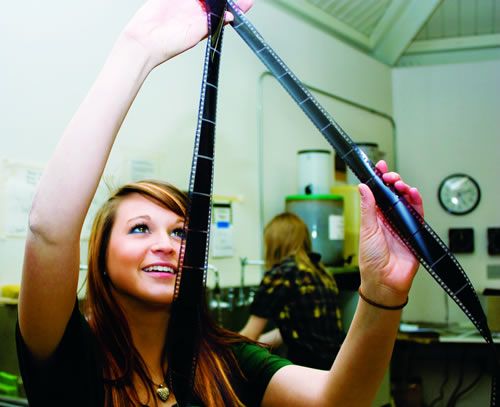
Contact the Pensacola State College Visual Arts Department for assistance in planning your program of study.
RELATED LINKS
SITE LINKS
SEARCH PROGRAMS
INTRODUCTION
The Associate in Science degree in Photographic Technology provides students with a thorough foundation in all areas of commercial, editorial, fine art photography and video production, preparing students to seek employment in the many field(s) of professional photography. The degree is designed to prepare individuals to reach their creative potential in professional photographic careers. The curriculum addresses proficiency with a multitude of camera format(s), print production, commercial studio lighting, and expertise in both analogue and current digital processes.
Upon graduation it can act as a transfer degree for persons wishing to continue their education toward an advanced degree at a university or professional art school. Additional general education coursework may be required for transfer to a four-year institution. Contact the four-year school for information.
The Associate in Science in Photographic Technology includes a College Credit Certificate in:
- Photography
Students in this program are encouraged to apply to graduate with each certificate as the requirements are satisfied.
We strongly encourage you to contact the Visual Arts Department for assistance in planning your program of study.
IS THIS FOR YOU
People in this career usually have artistic skill, enjoy creating original work and have a good imagination. They generally have social skills as well as good eye/hand coordination. They have been described as impulsive, ambitious, imaginative, intuitive, and patient.
BEYOND GRADUATION
Photographers may start out as assistants to experienced photographers. Assistants acquire the technical knowledge needed to be a successful photographer and also learn other skills necessary to run a portrait or commercial photography business. Freelance photographers should develop an individual style of photography to differentiate themselves from the competition. Some photographers enter the field by submitting an unsolicited portfolio of photographs to magazines and to art directors at advertising agencies; for freelance photographers, a good portfolio is critical.
RELATED CAREER OPPORTUNITIES
Primary Employers
Photography in all its forms has a tremendous impact in the creative, illustrative, and commercial fields and, consequently, is in great demand. Now, in addition to all the traditional uses of photography, digital imaging and the internet have added another fast-growing dimension to this field. Graduates from the Photographic Technology program may be employed by newspapers, magazines, advertising agencies, photo labs, public relations offices, realtors, printers, publishers, museums, and graphic designers.
Occupations
Photojournalists
Work for publications such as magazines, newspapers, and other print and electronic media. Their focus is generally on the documentation of events in a clear, illustrative way that speaks for itself as well as enhancing text. A Photojournalist’s work takes the min to the field to cover news events, sports, and human interest stories, among others. Photojournalists may also work as freelancers.
Creative Photographers
Are artist/photographers whose work is directed at personal artistic expression and is often shown in art galleries, museums, and competitions.
Photo Restorers
Take old or damaged photos and restore them by using digital scanning and Adobe Photoshop
Portrait Photographers
Are skilled at the studio techniques of lighting and backdrops to produce a variety of portraits of lasting interest in black/white and color.
Freelance Photographers
Are in business for themselves and are employed, usually on short assignments, by many different clients and might entail any type of photographic situation. While a freelancer has considerable leeway in managing their own schedule, being successful means building a group of clients, having a knowledge of business practices, understanding effective advertising, and knowing how to promote themselves.
Other Occupations
- Commercial Photographer
- Photo preparer
- Sports Photographer
- Photo Conservator (in prepress companies Photo Illustrator or the printing industry)

 PirateQ
PirateQ 